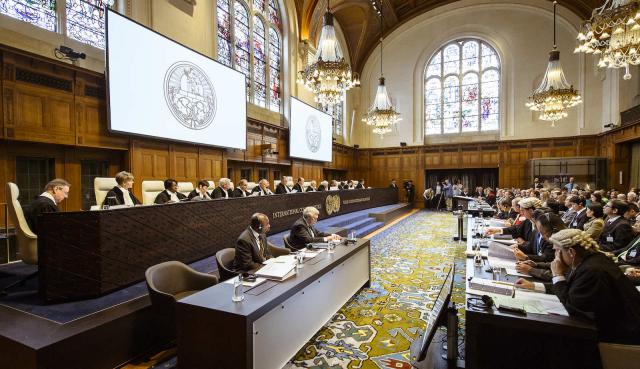Israel has made a significant decision to abstain from participating in a forthcoming session at the International Court of Justice (ICJ) in The Hague, set for Monday. This session is to deliberate on the contentious matter concerning the legitimacy of Israel's presence in Judea and Samaria, regions internationally recognized as the West Bank. This decision was collectively made by Prime Minister Benjamin Netanyahu, Foreign Minister Israel Katz, Justice Minister Yariv Levin, National Security Adviser Tzachi Hanegbi, and was also discussed with British law professor Malcolm Shaw, who has previously represented Israel in legal matters.
The impetus for this ICJ hearing stems from a United Nations General Assembly resolution passed on December 30, 2022. With a vote tally of 87 in favor and 26 against, the resolution seeks an advisory opinion from the court on the ramifications of what it alleges as Israel’s enduring breach of the Palestinian populace's right to self-determination, through what it terms as "prolonged occupation, settlement, and annexation of Palestinian territories since 1967." Furthermore, the resolution challenges Israel's actions that purportedly aim to modify the demographic and historical character of Jerusalem.
The International Court of Justice is set to begin a six-day-long debate on the 'legality of the 57-year-long Israeli occupation in the West Bank' on Monday. https://t.co/AMdJAtCAxd
— The Jerusalem Post (@Jerusalem_Post) February 18, 2024
The Israeli government has vociferously condemned the U.N. resolution. Prime Minister Netanyahu has particularly criticized it, asserting the Jewish people's historical and rightful connection to the land of Israel and Jerusalem, their eternal capital. He emphasized that no international decree could obscure this enduring truth.
The legal proceedings at the ICJ regarding this case differ markedly from a previous instance where South Africa petitioned the ICJ for an immediate cessation of Israel’s military actions against Hamas, pending a ruling on Israel's adherence to the Genocide Convention. Notably, the ICJ’s decisions in the current matter would be advisory and not obligatory. Despite its non-binding nature, such a ruling could be perceived as authoritative, posing challenges to contest in various legal forums.
Turner further elaborates on the possible ramifications this ICJ ruling might have on the International Criminal Court’s (ICC) stance towards Israel. The ICC had previously announced plans to investigate alleged war crimes by Israel but has proceeded cautiously. An adverse ruling by the ICJ could potentially embolden the ICC to intensify its inquiries, complicating Israel’s international legal challenges.
BREAKING:
— Visegrád 24 (@visegrad24) February 16, 2024
The International Court of Justice in The Hague announces it’s rejecting South Africa’s latest application and says the situation in Rafah doesn’t require additional measures from the Court.
Another win for Israel in the ICJ
🇿🇦🇮🇱 pic.twitter.com/UP1ehJzybX
The ICJ, a principal organ of the United Nations, plays a role in resolving state disputes and its advisory opinions are often cited as sources of international law. The upcoming hearing and its outcomes are poised to add another layer to the complex legal and diplomatic landscape surrounding Israel's position in the international community.


